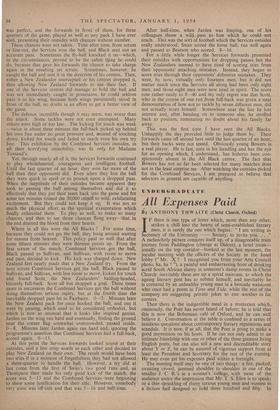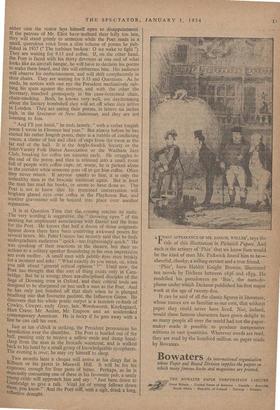All Expenses Paid
iy ANTHONY THWAITE (Christ Church, Oxford) IF there is one type of letter which, more than any other, strikes a chill into the hearts of semi-established literary men, it is surely the one which begins: " I am writing as SecietarY of the University — Society, to invite you. . . ." A melancholy picture conjures itself up, of a disagreeable train journey from Paddington (change at Didcot), a hotel room— usually on the top corridor—booked at the last moment, the jocular meeting with the officers of the Society in the hotel lobby (" Mr. X ? I recognised you from your Arts Council photo, ha, ha ! "), a painful and embarrassing hour of drinking acrid South African sherry in someone's damp rooms in Christ Church; inevitably these are up a spiral staircase, to which the ageing literary gent has to submit himself, and inevitably he is cornered by an unhealthy young man in a brocade waistcoat who once had a poem in Time and Tide, while the rest of the company are sniggering private jokes to one another in far corners.
Then there is the indigestible meal in a restaurant which, ominously, the Poet has never heard of before; he is told that this is now the Bohemian café of Oxford, and he can well believe it. Conversation at the table is confined to a series of insidious questions about contemporary literary reputations and scandals. It is now, if at all, that the Poet is going to make a good impression on his hosts. If he can not only admit to an intimate friendship with one or other of the three greatest living English poets, but can also tell a new and discreditable story about Y or Z, he can be assured of vigorous support from at least the President and Secretary for the rest of the evening. He may even get his expenses paid within a fortnight.
The meeting itself may be one of two things : a hot, packed; sweating crowd, jammed shoulder to shoulder in one of the smaller .f. C. R.'s in a woman's college, with most of the audience under the impression that Mr. T. S. Eliot is to speak; or a thin sprinkling of thirty serious young men and-women in a lecture hall designed to hold three hundred and fifty. In either case the visitor lays himself open to disappointment. If the patrons of Mr. Eliot have 'realised their folly too late, they will stand grimly to attention while the Poet reads in a small, querulous voice from a slim volume of poems he pub- lished in 1937 (" The turbines beckon : 0 we wake to fight "). They are waiting for 9.15 and coffee. If, on the other hand, the Poet is faced with his thirty devotees at one end of what looks like an aircraft hangar, he will have to declaim his poems to make them heard, and this will embarrass him. His audience will observe his embarrassment, and will shift complacently in their chairs. They are waiting for 9.35 and Questions. As he reads, he notices with one eye the President meditatively rub- bing his spats against the rostrum, and with the other the Secretary, hunched grotesquely in his cane-bottomed chair, chain-smoking. Both, he knows very well, are daydreaming about the literary bombshell they will set off when they arrive in London. They are seeing their poems, in letters six inches high, in the Spectator or New Statesman, and they are not listening to him.
" And I'll just finish," he ends lamely, " with a rather longish poem I wrote in Florence last year." But almost before he has started his rather longish poem, there is a babble of conflicting voices, a clatter of feet and clink of cups from the room at the far end of the hall. It is the Anglo-Swahili Society or the Inter-Varsity Folk Dance Association or the Wadham Jazz Club, breaking for coffee ten minutes early. He struggles to the end of the poem, and then is released into a small room full of people with coffee cups; or, worse, he is parked alone in the corridor while someone goes off to get him coffee. Often they never return. If anyone speaks to him, it is only the unhealthy man in the brocade waistcoat again. But 'at least the man has read his books, or seems to have done so. The Poet is not to know that his truncated conversation will brighten glazed eyes over coffee in the Playhouse Bar, and another gravestone will be hoisted into place over another reputation.
It is at Question Time that the, evening reaches its nadir. The very wording is suggestive; the " throwing open " of the meeting has unpleasant associations with Daniel and the lions for the Poet. He knows that half a dozen of those enigmatic figures down there have been contriving awkward posers for several hours. Mr. Peter Ustinov has recently said that he finds undergraduate audiences " quick—too frighteningly quick." He was speaking of their reactions in the theatre, but their re- actions to a solitary speaker floundering in his own imprecision are even swifter. A small man with pebbly eyes rises briskly for a moment and asks : " What exactly do you mean, sir, when you talk about ' general critical opinion "?" Until now, the Poet has thought that this sort of thing exists only in Cam- bridge. But he is wrong; there are disciplined disciples of the Sage of Downing even in Oxford, and their critical tools are designed to be sharpened on just such a man as the Poet. And he has only just brushed off that shaft when he is plunged headlong into that favourite pastime, the Influence Game. He











































 Previous page
Previous page